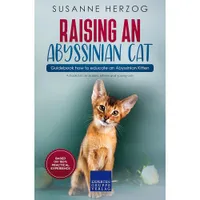The Abyssinian is the forever energetic cat breed that’s active and agile
Discover more about the Abyssinian and whether this regal-looking pet would be right for your home
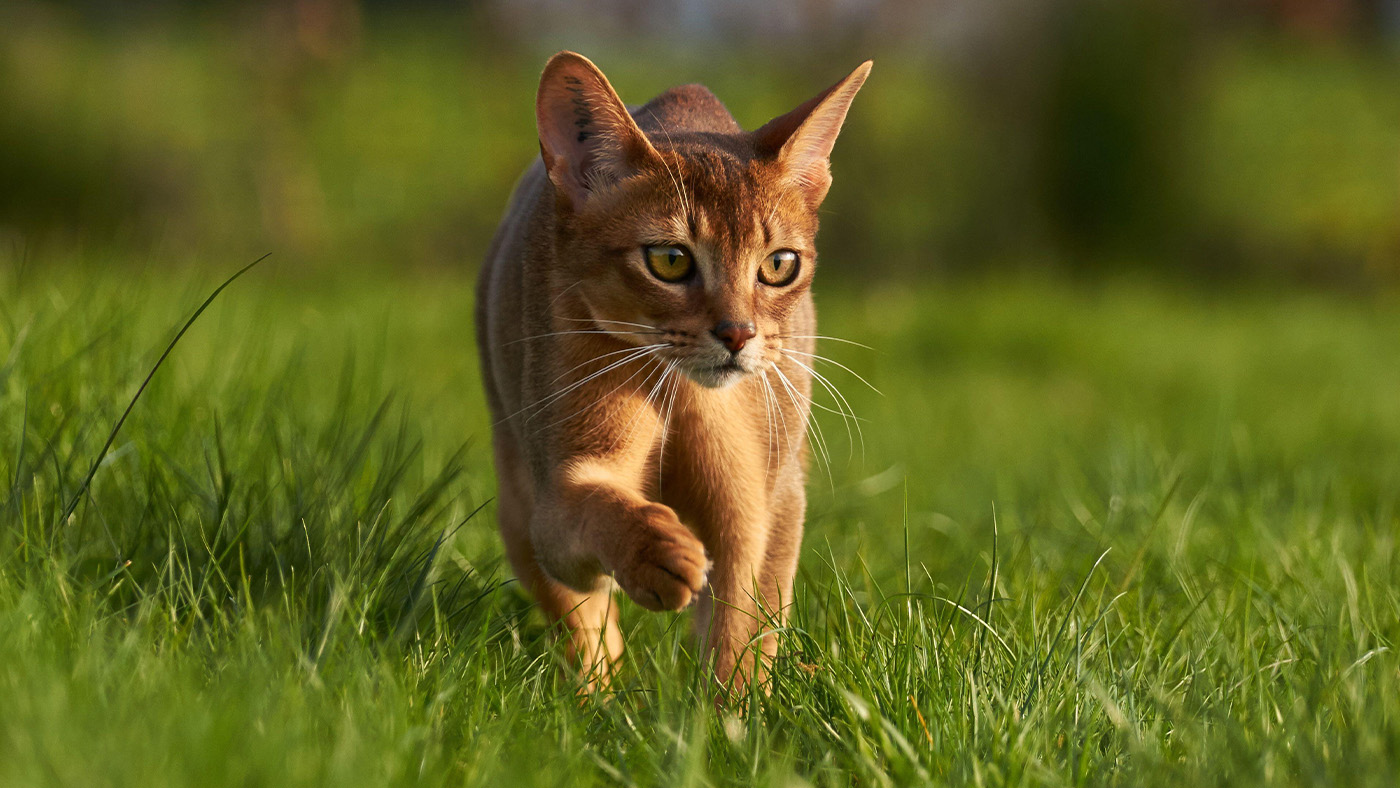
Get the best advice, tips and top tech for your beloved Pets
You are now subscribed
Your newsletter sign-up was successful
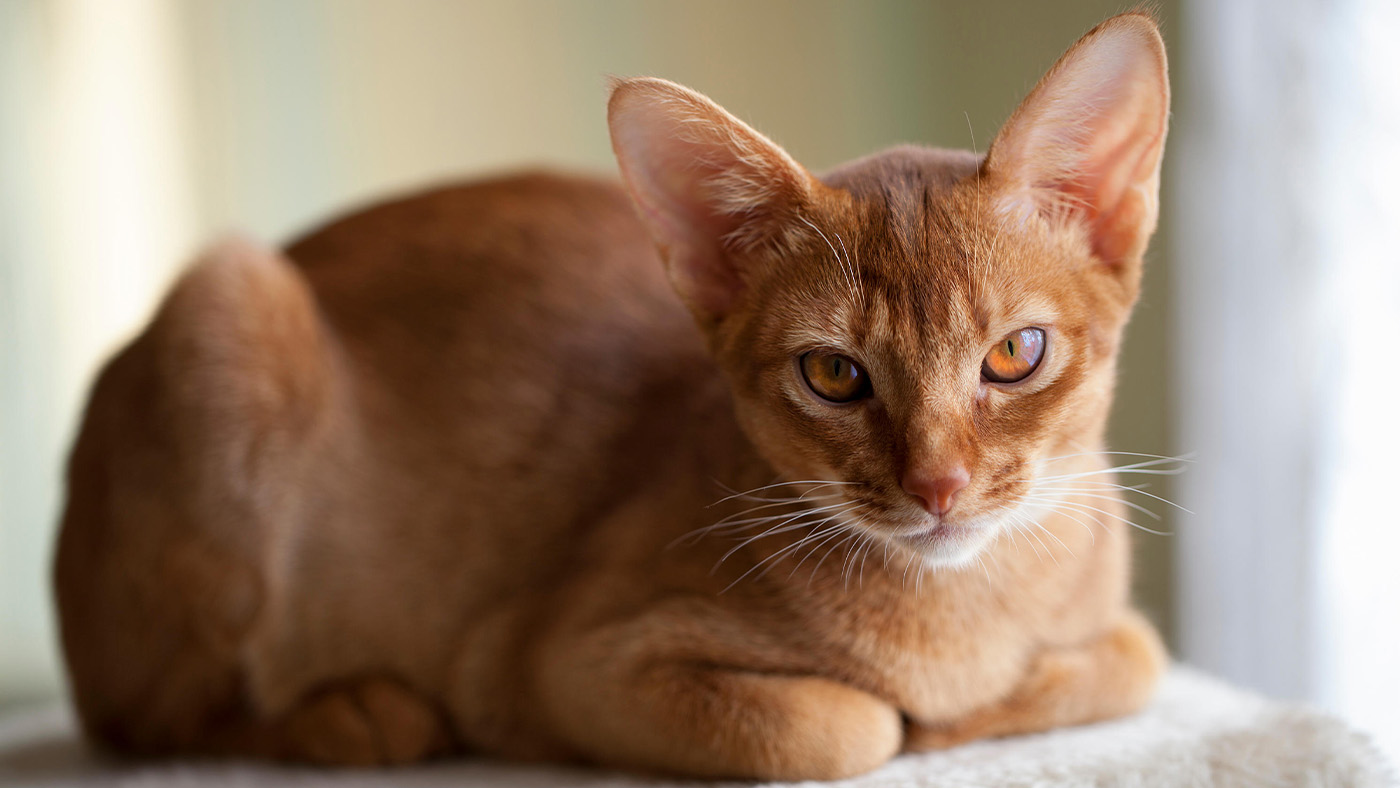
Other names: Abys or Aby
Life expectancy: 9-15 years
Size: Between 8–12 lb in weight and 8–10 inches in height
Coat (colour and pattern): Warm brown, red, blue and fawn coloring and ticked coat
Eye colour: Gold, green, hazel, or copper
Temperament: Loving, affectionate, quiet and intelligent
Origin/native country: Ethiopia
With their affectionate personality, playful character and love for human company, there are bundles of reasons why an Abyssinian cat is considered one of the most popular cat breeds of all time and one of the oldest cat breeds in existence.
Hailing from Abyssinia, which is now known as Ethiopia, this regal-looking breed is believed to have been imported into the UK in 1868 after the Abyssinian War, before making its way to the US in the early 1900s.
This breed is known and loved for its ticked tabby coat, which can range from warm brown and red to blue and fawn. But what really makes these beauties stand out is the fact that each hair is ticked with up to six strands of color, which results in a seriously shimmering coat.
Abys, as they are more affectionately known, also come with almond-shaped eyes which look like they've been lined with eyeliner (they haven't!). To discover whether these little beauties would fit into your lifestyle, we enlisted the help of Dr Rebecca MacMillan, who gave us the lowdown on everything from key health concerns to how much exercise these felines need.
Are Abyssinian cats hypoallergenic?
It’s worth knowing that no cat can be classed as 100% hypoallergenic. That’s because all cats produce varying amounts of a protein called Fel d1, including the Abyssinian.
“This protein is what triggers reactions in susceptible people,” Dr MacMillan explains. “It is spread from the cat’s saliva throughout the coat as they groom themself.”
However, in the animal world, the term ‘hypoallergenic’ is used to describe breeds that shed less. Or produce less of this protein.
Get the best advice, tips and top tech for your beloved Pets
If you are allergic to cats or just want to prevent fur from making its way all over your home, the good news is that Abyssinians are considered low shedders. They also tend to produce less Fel d 1 than some other breeds.
According to Dr MacMillan, this makes them less likely to cause severe symptoms in allergy sufferers. “So, in that regard, they may be considered a hypoallergenic cat breed compared to other fluffier breeds,” the expert adds.
Are Abyssinian cats rare?
Despite Abyssinian cats originating more than 8,000 miles away in Ethiopia, Abyssinian cats are not considered a rare breed in the US – they are actually a fairly popular breed.
As such, these little beauties are often found at cat shelters, adoption centres, and from reputable cat breeders.
“Abyssinian cats are not considered a rare breed," Dr MacMillan confirms. "But, in my experience, they are not as popular as other short-haired pedigrees like the Siamese or Bengal,”
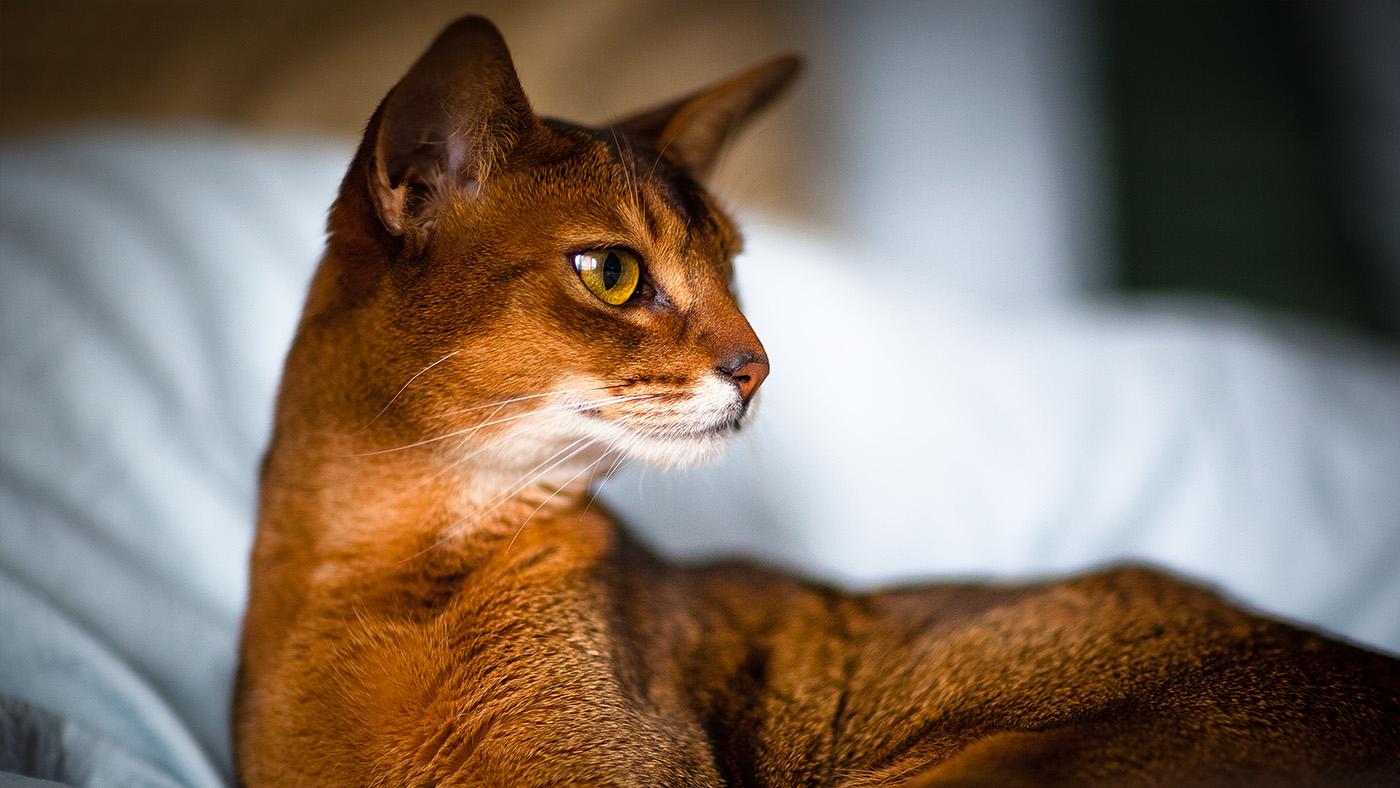
How much exercise does an Abyssinian cat need?
These lean and muscular cats are highly energetic with a capital E. It’s why they top our guide to the list of high-energy cat breeds that will want to play with you (or their toys) pretty much all of the time!
Therefore, if you are considering welcoming an Aby into your home, you will need to regularly engage in cat play to keep them mentally and physically stimulated.
“Generally, a healthy adult Abyssinian requires 30 minutes of exercise each day, but some will want more,” Dr MacMillan recommends. “This can be spread out into several, short play sessions.”
That said, while this little ball of energy might have a passion for staying active (you'll most often spot them climbing or jumping), they are very low-maintenance pets, as they are super independent. Therefore, they are perfectly happy to amuse themselves with the best cat toys.
How much grooming does an Abyssinian cat need?
With their short, sleek, smooth and shimmering coat, Abys generally only need brushing weekly to keep their fur looking its best.
To do so, it's worth investing in one of the best cat brushes for short-haired felines.
They will also need routine dental care and their nails trimmed to prevent potential health issues and safeguard their surroundings (like your furniture!).
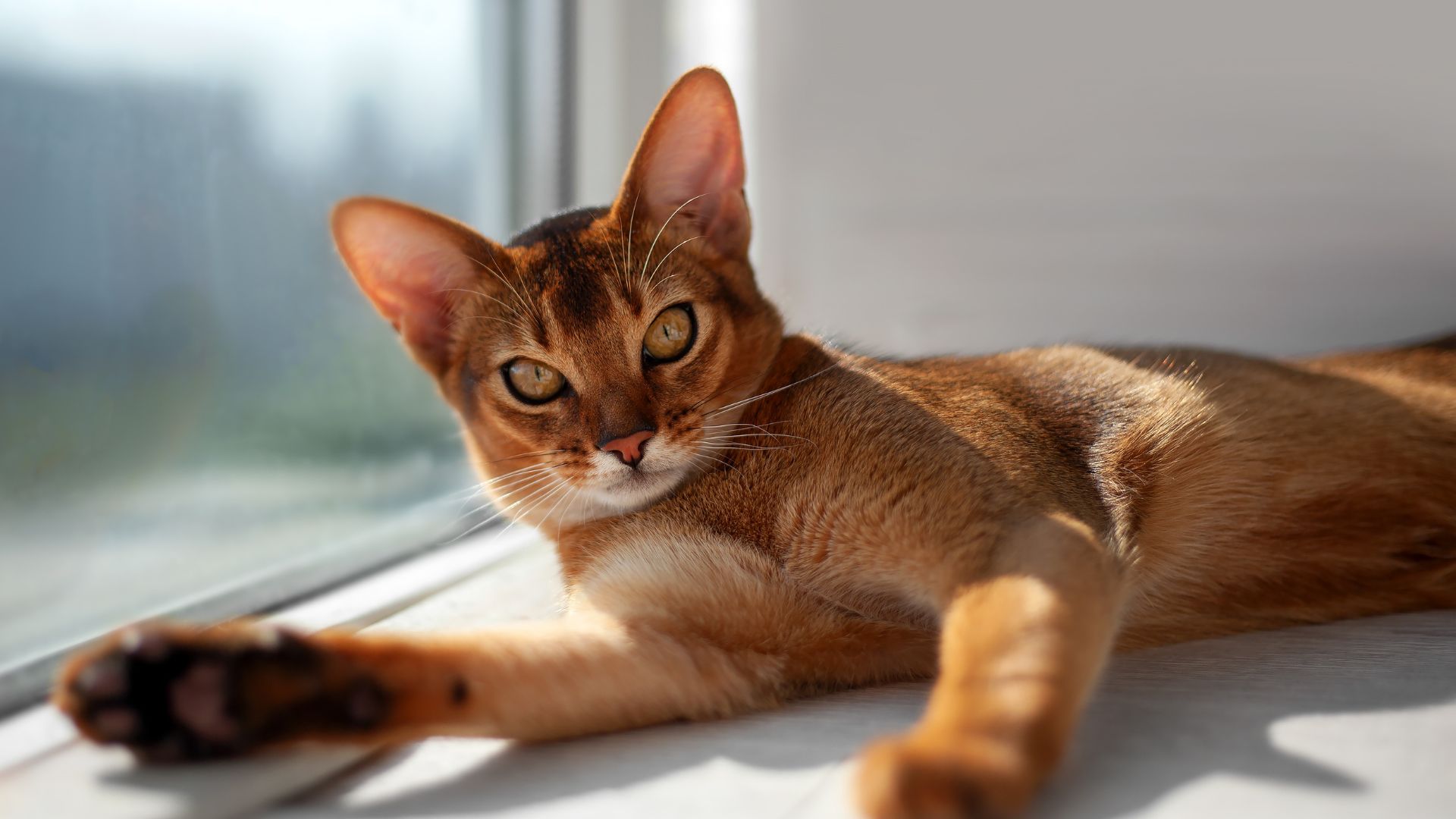
Abyssinian cat health problems
With their love for staying active, agile nature and lean and muscular bodies, Abys are generally healthy compared to other breeds. However, they are prone to a few hereditary health complaints.
“Pyruvate kinase deficiency (PKD) is an example of this,” Dr MacMillan says. “It causes problems with the cat’s red blood cells, leading to anaemia. For most cats, their episodes of anaemia are mild, but some can have more severe issues.”
According to Dr MacMillan, screening tests can help to identify cats that carry the genes for this enzyme deficiency.
Like many pedigree cats (like purebred or show cats), Abys are also prone to progressive retinal atrophy (PRA) Dr MacMillan tells us.
“The back of the eye deteriorates, leading to a gradual loss of vision, which cannot be reversed.”
This breed can also suffer from two joint conditions, including a dislocated kneecap (luxating patella) and a condition where the hip joint doesn't develop properly (known as hip dysplasia).
“These joint abnormalities can cause issues with mobility, as well as painful lameness,” Dr MacMillan notes.
Amyloidosis can flare up in Abys, but Dr MacMillan explains that this is now quite a rare condition due to careful breeding.
“Cats that suffer from this condition develop kidney failure at an early age, which is life-limiting," she explains. "Amyloid, made from abnormal proteins, collects in the kidneys, causing issues with the way they function.”
Unfortunately, there is nothing you can do to stop any of these problems from occurring, and they are not curable.
Therefore, your best bet is to purchase your kitten from a reputable breeder who only breeds healthy cats.
“You should check for evidence that they have carried out all the available health screens," Dr MacMillan says. "This will reduce the risk of your cat inheriting conditions like pyruvate kinase deficiency (PKD) and progressive retinal atrophy (PRA).”
Wisdom Panel Cat DNA Test | Amazon
Not sure exactly what breed your cat is? This kit screens for 70+ breeds, 45 genetic health insights and 25+ physical traits – because knowing every detail about your cat helps you understand how best to care for them.
How much does an Abyssinian cat cost?
Generally speaking, an Abyssinian kitten can set you back anywhere between $1,200 to $2,800 from a reputable breeder. But this will depend on the area. However, the price will be a lot less if you adopt an Aby from a shelter or adoption centre.
Just note, this is the upfront cost. So you will need to consider pet insurance/veterinary costs, and any food, toys, and bedding they need.
Abys are considered to be expensive compared to most common cat breeds, like a domestic shorthair or domestic longhair.
Should I get an Abyssinian cat?
These cats are very curious, intelligent, and people-oriented. They are also very active, so they’ll thrive on physical and mental stimulation.
Therefore, these high-energy creatures would be best suited to an owner who is geared up for one of the most playful cat breeds.
“They wouldn’t be a great choice for an owner who wants a sedate, lap cat,” notes Dr Macmillan. “These are also very sociable creatures that would prefer to be in their owner’s company, so leaving them home alone for hours on end is not recommended.”
Raising An Abyssinian Cat | Amazon
This book is the first of three that looks at raising, training and taking care of an Abyssinian cat.
Read next: Calmest cat breeds and facts about Abyssinian cats
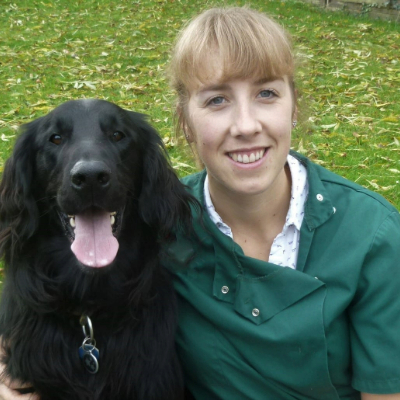
Having graduated in 2009 from the Royal Veterinary College in London as a veterinary surgeon, Rebecca is highly experienced in first opinion small animal practice, having done a mixture of day-to-day routine work, on-call emergency duties and managerial roles over the years. Rebecca recently achieved a BSAVA postgraduate certificate in small animal medicine (with commendation).
Rebecca writes on various feline and canine topics, including behavior, nutrition, and health. Outside of work and writing she enjoys walking her own dog, spending time with her young family and baking!
Edited by Georgia Guerin.
This feature was last updated in May 2025 by Becks Shepherd.

Becks Shepherd is a lifestyle journalist who has worked with titles such as Tom's Guide, Marie Claire, and Fit and Well.
In addition to this, she’s a pet writer with nearly a decade of editorial experience across digital and print media. A devoted “dog aunt” and lifelong animal lover, Becks brings a personal touch to her pet content—whether she’s testing the latest dog gear or digging into behavioral tips.
She works closely with veterinary experts to ensure factual accuracy and is currently exploring animal care certifications to deepen her knowledge. Her work has appeared in leading outlets across health, wellness, and pet care spaces.

